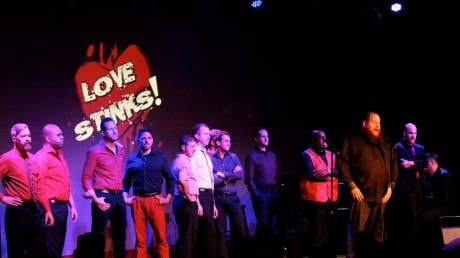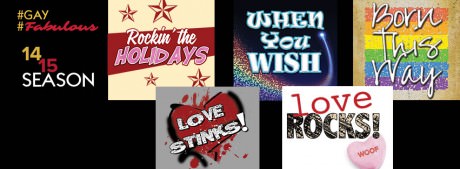Love and song go together so well they’re a compound noun. Who doesn’t love a love song? But what about love that is disappointing, unreciprocated, wounding—all the loves that dare not speak their pain? What kind of song goes with that? Last night at Atlas Performing Center the Gay Men’s Chorus of Washington, DC (GMCW) offered a rousing reply. Borrowing the hook from a J. Geils Band classic, eleven GMC soloists sang a sixteen-song selection called Love Stinks! And it would be hard to imagine love gone wrong sounding more wonderful.

First of all is the pleasure of hearing such a beautiful assortment of male vocalists one after another. There’s something deeply moving about the human voice when it sings purely from the heart in the vocal timbre and range called male—because it’s a voice that manifestly does not play by the manhood rules. It is a voice unmasked, unaffected, and unfiltered by macho posturing and aggression. It is a voice at ease in itself, in its full expressivity and its natural pitch range. It is not a voice that has been butchified, forced to sound lower than it wants to (a habit that over time makes men sound gruff and gravelly because it turns the supple vocal cords they were born with to gristle). Honest emotion, much less heartbreak, is not what manly men are supposed to express—which is why the unfalsified male singing voice is especially stirring.
The gift that Gay Men’s Chorus keeps giving is the beauty of male voices free to be. It liberates because it is liberated. Could a Straight Men’s Chorus give that gift as well? Well, sure, of course. Vocal cords don’t have a sexual orientation (you just have to not wreck them trying not to sound unmanly). But could a Straight Men’s Chorus deliver a program with the emotionally revelatory content of Love Stinks!? I don’t think so.
All the performers were on stage the whole time, dressed in a red-black-white color scheme and seated onstage at cabaret-style tables; then one by one they stood and took the mic. Each of the songs in the program told a story and each was introduced by a singer who told a story from his own life—of a lover who left, a lost love who can’t be forgotten, a boyfriend who betrayed, a relationship turned emotionally and verbally abusive. These candid personal snippets cued up the song choice with the precision of set-up scenes in well-wrought musicals. The personal stories and songs weren’t all torchsongy downers; some were upbeat, sweet, and silly—a couple comically bickering, high hopes for a newfound romance, strategies to steer clear of a jerk. They ran the gay gamut. And the fact that the gamut was gay became more and more significant as the rich narrative arc of the song list was revealed.
I’m guessing each of the soloists had a say in the songs they sang, because the songs suited them so right. The performers, appealing one and all, were GMC members Matt Beck, Jarrod Bennett, Richard Bennett, Stuart Goldstone, Kip Jacobs, Garrick Jordan, Lonny Smith, Michael B. Smith, L. Owen Taggart, Kevin Thomason, and Matt Thompson. But credit for the artistry and tapestry of the evening as a whole belongs to Director Thea Kano and Assistant Director Eric Peterson, along with the masterly musicianship of Pianist Jason Sherlock. What emerged from all the singers’ stories—of lost and regretted loves, of longings and heartaches, of relationship fits and spats—was a composite character who was greater than the sum of the individual men’s hearts, a kind of collective soulfulness, an Everyman Yearning for the Love of Another Man. There onstage in the Lang Theatre auditorium was compiled, in separate stories and songs, a candid compendium of exactly what that feels like—and boy could the audience relate.
The last number was astounding (and since this was one a one-night-only show I can report it without giving away a spoiler). The entire cast sang “Cell Block Tango” (“He Had it Coming!” from Chicago, with originally scripted anecdotes of deserved revenge that were howlingly funny. Every (wronged) man Yearning for Love got his collective comeuppance, and the audience responded to the imagined justice with jubilation. It was a funny and feel-good finale to a show that dared to name the love that hurts.
Running Time: 2 hours, with one intermission.
Love Stinks! was performed twice Saturday, November 15, 2014, 5 pm and 8 pm, at The Lang Theatre at Atlas Performing Arts Center – 1333 H St NE, in Washington, DC. For future GMCW shows, go to their website.
LINKS
Gay Men’s Chorus of Washington, DC Announces its 2014-2015 Season By Craig Cipollini.
Gay Men’s Chorus Names Dr. Thea Kano Artistic Director.
The Energy and Commitment of the Gay Men’s Chorus of Washington, DC by David Friscic.
Read reviews of GMCW performances on DCMetroTheaterArts.
SONG LIST
Live Alone and Like It……………………….Kip Jacobs
Not Over You…………………………………Jarrod Bennett
It All Fades Away…………………………….Lonny Smith
You Can Always Count on Me………….Owen Taggart
Stormy Monday……………………………Garrick Jordan
Not A Day Goes By……………………….Kevin Thomason
Wherever He Ain’t………………………Stu Goldstone
Maybe This Time…………………………Rick Bennett
If You Hadn’t, But You Did…………….Matthew Thompson
Act 2
Fine…………..Stu Goldstone and Kevin Thomason
There’s a Fine, Fine Line……………….Rick Bennett
Perfect……………………………………….Owen Taggart
Stars and the Moon………………………Michael B. Smith
I Don’t Remember Christmas………….Lonny Smith
To Excess……………………………………Kip Jacobs
Lay Me Down…………………………….Matt Beck
Cell Block Tango…………………………..Company






